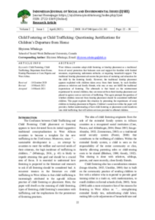Abstract
West African countries adopt child fostering or kinship placement as a traditional form of social protection that balances care and support for families with limited resources, experiencing unforeseen setbacks; or requiring household support. The traditional kinship placement advocates the provision of nurturing and education for the child by the fostering family. However, the traditional kinship placement appears exploited with children taken away from their homes, by such familiar persons as relatives and family friends, who may or may not fulfill the traditional expectations of fostering. The aftermath is that based on the mistreatment experienced by several children, they are removed from their kinship placement and placed in agency care as survivors of trafficking. This again prompts the question of whether children removed from kinship placement should be considered trafficked children. This paper explores this situation by presenting the experiences of some children in kinship placement in Nigeria. Children's narratives within the paper will provide a further understanding of how child fostering or placement could transform into child trafficking that will inform services provided to affected children

